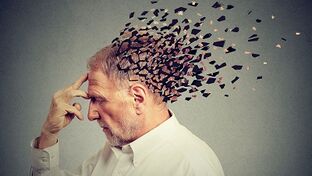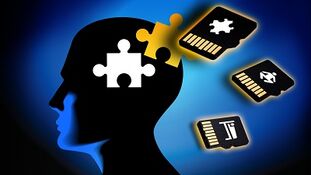
There are diametrically opposed views on memory-enhancing drugs. Some say that it is useful and helps to deal with increased spiritual stress, that it really helps and effectively.
Others say that this is just a myth, that there is no benefit to taking such drugs, that it can even be harmful and addictive to these drugs. Let us try to examine both points of view in more detail and understand who is right.A little about memory
Memory is a mental function of higher neural activity, with the help of which the accumulation, preservation and reproduction of previously received information takes place. Memory allows you to store for a long time information about the outside world or the body's reactions to any impact and also allows you to use this information to properly organize activities in the future.
Memory involves many different but related processes.
- Memorization- introduction of new data, senses.
- Storage- the accumulation of data, senses, includes their processing and assimilation. This process allows a person to learn, develop his thinking and speech.
- Reproduction and recognition- realization of elements, actions, senses from the past. Reproduction is involuntary (elements "float" in a person's mind without his will and efforts) and arbitrary.
- Forgetting- loss of the ability to play and recognize previously remembered items. It can be temporary or permanent. There is an imperfect forgetting when information is reproduced or recognized in error or in part.
Basic memory types
There are many types and subtypes in memory classification. Let's talk about its main types.
- Sensory memory- retaining information from the senses after stimulation.
- Touch Memory- retain information from receptors as a result of touch.
- Engine memory- storing motion information, many may remember that there are movements that are performed automatically.
- Semantic memory- store information about events, for example, stories, dates, multiplication tables
- Short-term memory- store information for a short time. It has a small volume.
- Long-term memory- storage of information indefinitely, including for life.
Laws of memory

Few people know that there are several laws of memory. This is not the author's invention, but real-life models that have been scientifically proven and proven.
- Law of repetition- information is remembered much better if repeated several times.
- Law of Interest- if a person is interested in information, then they will remember it faster and better.
- Law of the Edge- the information given at the beginning and end is better remembered.
- The law of understanding- if the information is deeply understood, then we will remember better.
- The law of optimal string length- the amount of information stored should not exceed the amount of short-term memory.
- Installation Act- a person who has given himself the installation he needs to remember this or that information will remember it faster and better.
- Suspension Law- when memorizing similar concepts, the old information "overlaps" with the new one.
- The Law of Content- when you memorize things that can be related to already known concepts, it goes faster.
- The law of action- if what he remembers is used in practice, then memorization becomes more efficient and faster.
These laws can be used if you want to remember something faster and better, as well as train your memory.
Reasons for memory loss
- Organic brain damage- acute cerebrovascular accident, traumatic brain injury, brain tumor.
- Diseases of other organs and systems- diseases of the liver, cardiovascular system.
- External factors- poor ecology, a sudden change in the surrounding living conditions, stress, sleep disorders.
- Age-related changes in brain structure- reduction in the number of internal connections.
- Chronic poisoning- smoking, drug use, substance abuse, alcoholism, drug abuse (sedatives, sedatives).
Treatment of memory disorders
Medications are not prescribed immediately if memory improvement is required. First they try to apply drug-free methods. These include:
- Fast walks in the fresh air. This increases the access of oxygen to the brain. This improves the efficiency of his work.
- Normalize sleepand wake up.
- Evening workout- the habit of remembering all the events of the day in reverse order, that is, first of all, remember what happened in the evening and at the end - the morning events, canunusual workout. It is best to do this before going to bed, lying in bed.
- Positive attitude, do not rely on it- do not think you have a bad memory, no one canceled the effect of self-hypnosis. If at some point you can not remember something, then do not worry, do not get angry, but just distract yourself, do something else, and then try again to remember what you forgot.
- Daily training- solving crosswords, puzzles, scan words.
- Education- learn poetry, foreign languages, do it regularly, gradually increase the amount of material you learn.
Medications for memory loss

It is clear that learning poetry, a foreign language, solving puzzles is not easy, you have to "push", for walks and solving puzzles you have to spend extra time, which practically does not have aemployee.
It is much easier to take a pill, calm down and hope for the magic power of the medicine - your memory will immediately improve and you will not have to do anything! The modern city dweller is so lazy and spoiled by the fruits of civilization that now few people are so purposeful and want to spend their time and energy on memory training. So, one person is looking for an answer to his question - what pills to improve memory are there?
Well, let's look at two opposing views on the subject:
Positive opinion
Proponents of using these funds say that some drugs help to improve the blood supply to the brain cells, thus improving their nutrition and supplying more oxygen, which improves the metabolic processes in the neurons.Nootropics and drugs that improve the rheological properties of the blood help with this.
Herbal preparations have become widespread, which not only improve the metabolic processes in neurons by themselves, but also enhance the effect of nootropic drugs.But we must remember that any (absolutely any) drug has its own contraindications and side effects, so it should only be prescribed by a doctor in each specific clinical case.
Negative opinion
According to some experts, there is also a downside to currency. Several years ago, experts were puzzled by the question - are these drugs effective or are they just a fictitious effect?
As a result of numerous studies, the effectiveness of nootropics has not been proven. There is no evidence that they have a beneficial effect on memory. One of the small studies on the effectiveness of drugs has shown that they have little effect, but not in severe cases.
Traditional methods and herbal preparations such as ginseng, vitamin E, have virtually no research. The evidence base concerns only the use of herbal medicines in patients with dementia. But there are no data on the effectiveness of use in relatively healthy people.
In conclusion, I would like to say that when I think about which memory-enhancing drugs are best, do not forget that they must be prescribed by a doctor. And the doctor should also evaluate the effectiveness in each case. Do not rely on advice from friends, neighbors or relatives.
If you think your memory has deteriorated, see a neurologist. Maybe this is not the problem at all, attention may be disturbed, there may be other problems. It is also necessary to know the cause of this condition. And this can only be done by a specialized doctor.







































































